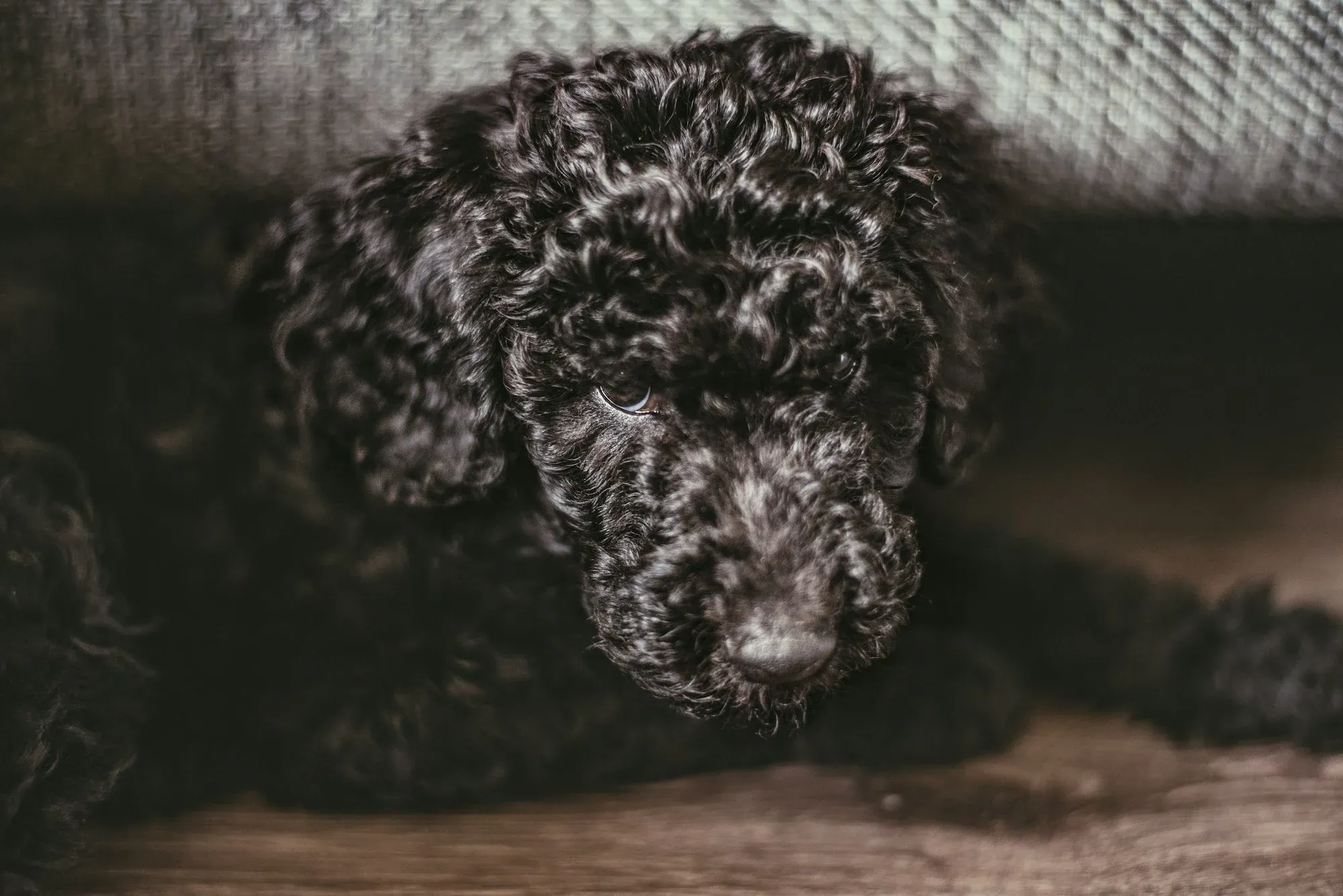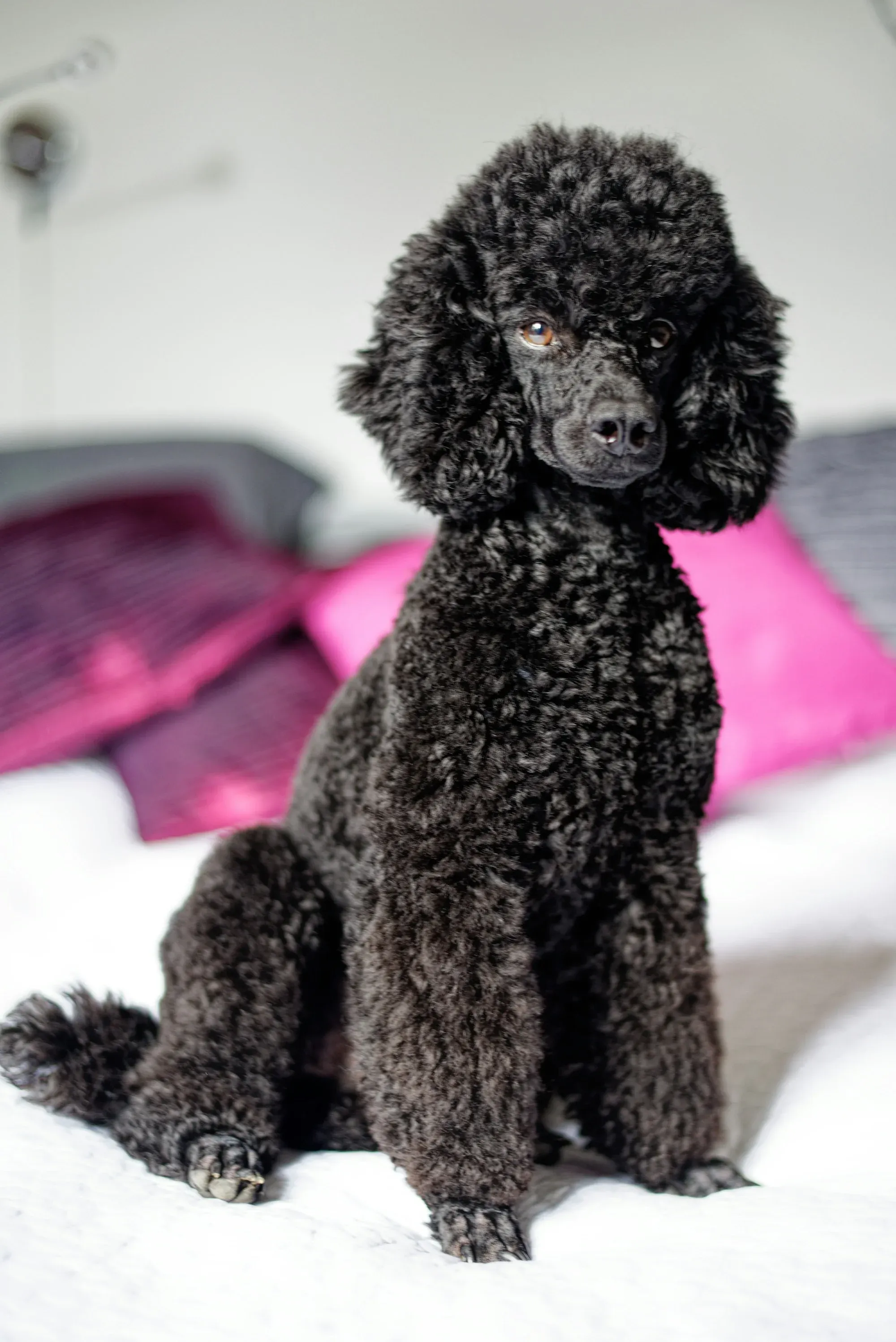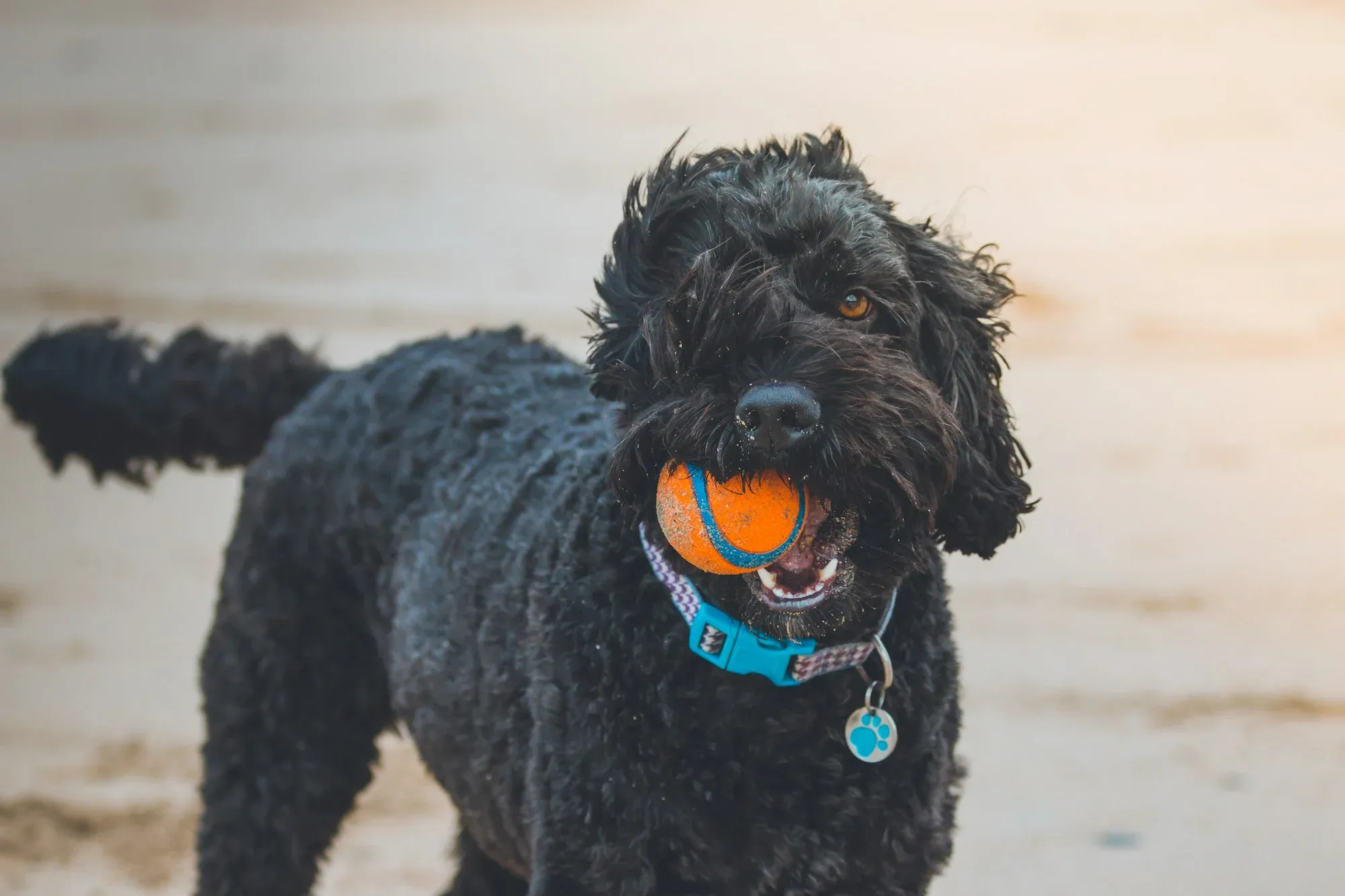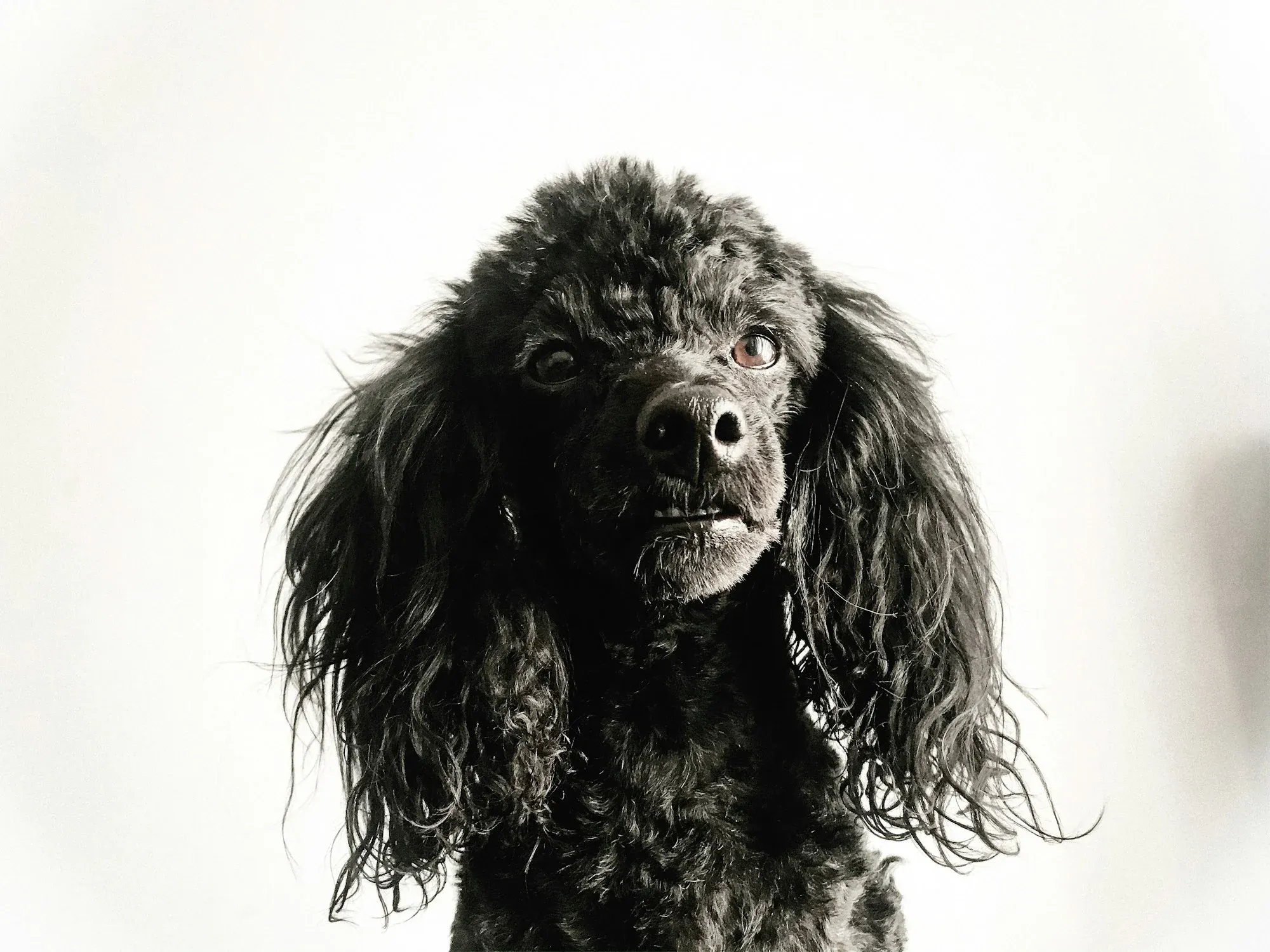The Black Poodle is a widely sought after type of Poodle due to its elegant coat and charming personality. If you are considering adopting a black Poodle, there is much you should know about this prized dog’s history, appearance, temperament, and care.
About the Black Poodle
“Black Poodle” is not a distinct breed. It is a coloration that can be present in various sizes of Poodles, including Standard, Miniature, Moyen, and Toy Poodles.
Like all other colors of Poodle, black poodles are descended from water-retriever dogs. They have a long history of being both working dogs and companion dogs.
There is a dispute about whether the Poodle originated in Germany or France. Either way, Poodles were originally working dogs bred to retrieve shot game and lost arrows.
Poodles are a popular dog breed for several reasons. They are intelligent and friendly. They have a beautiful and striking appearance. Also, they have certain hypoallergenic qualities.

Black Poodle Appearance and Genetics
A black poodle can either have solid black fur over its entire body, or black along with another color. Black Poodles have black eyes, lips, noses, and toes.
Entirely black Poodles are one of the most popular Poodle colorations due to their striking appearance. A genuine black Poodle does not have any white or silver tint in its fur.
Poodles have both an outer and inner coat. The outer coat is the one that is easily visible. The inner coat is beneath the outer coat and is not so easy to see.
All black Poodles have a black outer coat, but some have an inner coat that appears blue or gray. Having a blue or gray inner coat can make the black outer coat appear lighter.
Sizes of The Black Poodle
The height and weight of a Black Poodle depends on which size category they fall into.
Standard Poodles are over 15 inches tall and weigh somewhere between 40 and 70 pounds.
Miniature Poodles are classified as being between 10 and 15 inches tall and weighing between 10 and 15 pounds.
The smallest size category is the Toy Poodle, which is under 10 inches tall and weighs only 4 to 6 pounds.
The Moyen Poodle
There is another, somewhat lesser known, size category of Poodle known as the Moyen Poodle. "Moyen" means "medium" in French.
Moyen Poodles fall between Miniature and Standard Poodles in their size and weight. Usually, Moyen Poodles are 15 to 19 inches and weigh 15 to 25 pounds. The Moyen Poodle is not yet recognized by the American Kennel Club, but with its growing popularity, it may be recognized soon.
Fans of the Moyen Poodle praise their medium size. Their size makes them well suited to being lapdogs but also large enough to keep up with their owners during physical activities and outdoor adventures.
You can learn more about the Moyen Poodle here.
Regardless of what size category they fall into, all Poodles naturally have a muscular but slim form. Poodles also have long muzzles. Their fur is either corded or curled. Poodle fur is known to require high maintenance.
Secure and Style Your Black Poodle with the Fi Dog Collar
Choosing a black Poodle means bringing a uniquely elegant and charming companion into your life. To enhance their safety and complement their distinctive personality, consider the Fi Dog Collar, essential for every discerning dog owner.
The Fi Dog Collar features advanced GPS tracking, allowing you to monitor your Poodle's location in real-time. Its robust geofencing alerts you if your dog strays from safe zones, ideal for adventurous Poodles. Additionally, the collar's activity monitor helps ensure your dog stays active and healthy, tracking their exercise and sleep patterns.
Stylish and durable, the Fi Dog Collar matches your Poodle's sleek appearance, making them look as good as they feel wherever you go.
Enhance your peace of mind with the Fi Dog Collar, knowing your elegant Poodle is as safe as they are stylish.
What Causes Black Fur?
The black fur color seen in black Poodles is caused by the same process that determines the coat colors of all dogs.
Two pigments determine what color a dog’s coat will be. These pigments are eumelanin and pheomelanin. To make it simple, if genes connected to eumelanin are dominant within a dog, that dog will have a black coat.
The gene that leads to black fur is stronger than the gene for other coat colors. This means that it is easier to breed black Poodles even if they only have a small amount of eumelanin in their genetics.
Black Poodle puppies can be born even if neither of the parents have black fur. This can happen if one of their ancestors further back had black fur.
The genes that lead to black fur on Poodles do not have an effect on the Poodles' personality or health.

Are Silver Poodles Born Black?
Some silver or gray Poodles are born silver or gray. But some black Poodles do eventually turn silver or gray.
There are two ways a black Poodle can end up turning silver or gray.
The fur of true black Poodles does eventually start to turn gray, but this happens gradually when they transition from an adult to a senior dog. In this type of graying, the gray fur will not always spread to the entire body. Often, the graying will start around the muzzle and spread from there.
Using a color-enhancing shampoo can reduce the appearance of fading in a black Poodle’s coat.
In some cases, a Poodle can be born black and gray prematurely over the first two years of its life. It can be hard or even impossible to tell if a black Poodle puppy will remain truly black. If the coat is going to change color, this process will usually start within the first few months of the dog’s life, but the time frame can vary.
Are Black Poodles Friendly?
Black Poodles, when raised with proper training and socialization, are just as friendly as any other coloration of Poodle. Poodles are energetic dogs, so they need exercise every day. They are also intelligent, and thus need mental stimulation as well as physical stimulation.
Though well-trained black Poodles are no different from other Poodles in their temperament, they unfortunately face a stigma due to their coat color.
Studies have uncovered a phenomenon known as “black dog syndrome.” Black dog syndrome is a phenomenon where humans tend to see black dogs as more aggressive and less loving than their counterparts with lighter coats.
Several causes for black dog syndrome have been suggested. Often, large black dogs are portrayed as violent and intimidating in movies and television shows. Black dogs are also known to not photograph as well as lighter colored dogs.

Caring for a Black Poodle
Caring for a black Poodle is just like caring for any Poodle. The only notable difference is that dirt and tangling can be harder to see on dark coats. Because of this, you should not hesitate to groom or bathe your black Poodle just because their fur doesn’t look dirty or tangled at first glance.
Short haircuts are a popular choice for Poodles, since this makes their coils or curly fur easier to manage. Poodles need to be groomed daily. They also need to visit the groomer regularly, unless you feel comfortable trimming their coat at home.
Poodles are naturally slim dogs. It is easy for them to become overweight if their diet is not properly monitored. It is important to talk to a vet about the best diet for your black Poodle.
One thing that dog owners often forget is that treats used in training can add up in calories over time. To prevent excess weight gain, subtract treats used for training from your Poodle’s daily calorie allowance.

Black Poodle Health
The genes that cause a black coat in Poodles are not known to be connected to any health issues. As such, monitoring the health of a black Poodle is similar to monitoring the health of any other shade of Poodle.
It is important to note that the likelihood of certain health conditions occurring can be affected by the size of the Poodle.
Poodles can be affected by a wide variety of health ailments, but there are several that are especially common within the breed. These include:
Dental problems
All dogs are susceptible to dental problems, including tartar buildup and gingivitis. This is why it is important to brush your pup’s teeth and take them in for regular dental cleanings.
Heart problems
The category of "heart problems" covers a wide array of issues that can affect all dogs. This includes heart murmurs and arrhythmias.
Hip and elbow dysplasia
Hip and elbow dysplasia refers to painful abnormalities in the hip and elbow bones.
Addison’s disease
Addison’s disease is a condition where the adrenal glands fail to produce enough cortisol and aldosterone.
Patellar Luxation
Patellar Luxation is an abnormality in the kneecap that can cause issues with mobility.
Progressive Retinal Atrophy
Progressive Retinal Atrophy refers to a group of diseases that cause photoreceptor cells in the eyes to degenerate, resulting in reduced vision.
Sebaceous Adenitis
Sebaceous Adenitis is a condition that affects the sebaceous glands. These are the glands in the skin that keep skin and fur healthy. When these stop working properly, damage to the skin and fur will result.
This is by no means a complete list of health issues that can affect Poodles. Regular checkups at the vet are a must for any dog. Don’t hesitate to see your vet about any symptoms you notice in your pup.
Other Poodle Colors
Poodles are known for having a wide variety of coat colors. These various coat colors do not lead to any differences in temperament.
Possibly the most popular shade of Poodle next to the black Poodle is the white Poodle. Many people feel that white fur makes Poodles appear more soft and cuddly.
Brown Poodles come in a variety of shades, from dark brown to a more tan color.
Red and apricot are rarer than most other colors of Poodle. Their fur has hues of copper or auburn within it. Apricot is usually considered to be the color most recently introduced to Poodle breeding, so it is more difficult to breed.
Not all gray Poodles are senior dogs. Poodles can be born gray. Or, as discussed earlier, they can gray prematurely.
Conclusion
Even once you have decided to bring a Poodle into your life, you still have many options when it comes to the size and coloration of your new pup.
No matter your living situation or personal preferences, between the Toy, Miniature, Moyen, and Standard Poodle, there is sure to be a size that will work for you. And with their multitude of coat colors, you can be certain to find a pup that fits your aesthetic tastes.
Many regard the black Poodle as the most beautiful and elegant of all Poodle colorations, and it is easy to see why. Still, with their friendly and energetic personalities, any type of Poodle is sure to bring light into your life.
For more helpful articles about pet-parenting tips, check out the Off Leash blog at TryFi.com.
Want to know more about TryFi.com? The Fi Dog Collar is a GPS tracking collar that not only keeps track of your dog’s location, activity levels, and sleep patterns, but it also alerts you if your dog escapes your backyard. This is the fastest way to find your dog after an escape. Try the Fi Dog Collar today!






